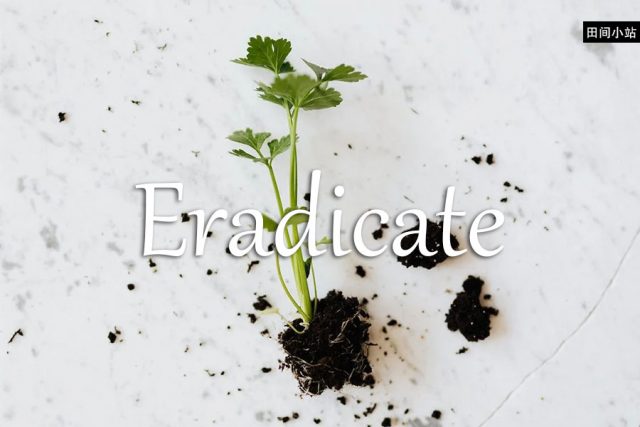本文经授权转载自微信公众号:田间小站

TOEFL TEM8 GMAT GRE
外刊例句
- Smallpox was officially eradicated in 1980, and no one laments the fate of the virus that caused it; campaigns to save the virus that causes polio are thin on the ground.
天花在1980年被正式消灭,没有人为天花病毒的命运哀叹;也没见人发起过什么运动拯救导致小儿麻痹症的病毒。
——《经济学人》 - Several days later, however, Clinton reversed himself again, saying it was more important to safeguard vital social programs than to eradicate the deficit in the relatively near future.
数天后,克林顿的态度有了180度的转变,说保住重大的社会计划比在较短的时间内消除赤字更为重要。
——《时代周刊》
基本释义
[verb] destroy completely; put an end to
[动词] 彻底摧毁;终结
深入解读
Eradicate 一词源自拉丁语 eradicare (铲除、根除、消灭)的过去分词 eradicatus ,由前缀 e- (无;除去)+词根 radic (根)+后缀 -ate (做,造成,使)构成,15世纪初进入英语后也是用来表示“根除、杜绝、扫除”,多指彻底摧毁或消除疾病、腐败、贫穷、迷信等已经扎根或已经确立的不良事物,就像是杂草拔根一样完全去掉,常用搭配 eradicate sth (from sth) ,比如:
- 如果可以消灭那些单调乏味的工作,世界将会变得更加美好。
If tedious tasks could be eradicated, the world would be a much better place. - 政府声称正尽其所能根治腐败。过去几十年来他们的国家一直饱受政治腐败之苦。
The government claims to be doing all it can to eradicate corruption. Their country has been afflicted by political corruption for decades.
权威用例
十年来,我们经历了对党和人民事业具有重大现实意义和深远历史意义的三件大事:一是迎来中国共产党成立一百周年,二是中国特色社会主义进入新时代,三是完成脱贫攻坚、全面建成小康社会的历史任务,实现第一个百年奋斗目标。
The past decade marked three major events of great immediate importance and profound historical significance for the cause of the Party and the people: We embraced the centenary of the Communist Party of China; we ushered in a new era of socialism with Chinese characteristics; and we eradicated absolute poverty and finished building a moderately prosperous society in all respects, thus completing the First Centenary Goal.
出自党的二十大报告。
名著用例
My fingers had fastened on her hand which lay outside the sheet: had she pressed mine kindly, I should at that moment have experienced true pleasure. But unimpressionable natures are not so soon softened, nor are natural antipathies so readily eradicated.
我紧握住她搁在被头外面的手。要是她和气地握一握我的手,此刻我会由衷地感到愉快,但是顽固的本性不是立刻就能感化的,天生的反感也并非轻易就能消除。
出自英国女作家夏洛蒂·勃朗特(Charlotte Brontë)创作的具有自传色彩的长篇小说《简·爱》(Jane Eyre)。
同近义词
- eliminate: completely remove or get rid of (something)
- exterminate: destroy completely
- annihilate: destroy utterly; obliterate
